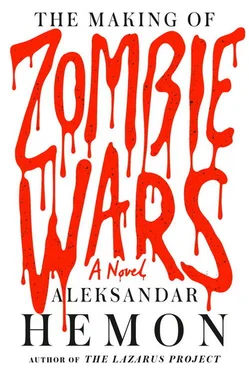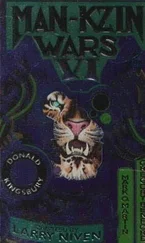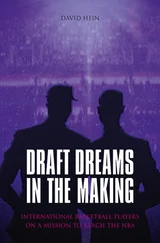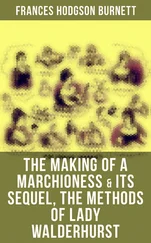An hour later he attempted to open the bathroom door but it was locked. He tried again, baffled by the resistance. For a moment, it seemed he was inside one of his dream traps, but then he heard gasps and yelps and thought it was Ana crying. He removed his hand from the knob, because he didn’t want to deal with her tears. Ana, however, came out of the bedroom wearing his blue button-up linen shirt. Where did she find it? It was a summer shirt, displaced deep in the back of his closet.
“I was cold,” Ana said, holding her elbow like John Wayne.
“It’s okay,” Joshua said. Her short hair was all messed up and stood up in spikes. For the first time he noticed its stubborn thickness, rhyming with the fat dark lines of her eyebrows. “I think your daughter is in the bathroom.”
“She will have been there whole day,” Ana said.
Joshua knocked on the door, just to make sure Alma knew they were outside, that her mother could now hear her crying. How exactly have I ended up here, he thought, outside a bathroom of tears? Alma came out, wearing only a skimpy top and panties, her puppy breasts protruding. He could smell her: she reeked of morning adolescence, of glands and hormones, of nascent adult loneliness. She skipped by him, flashing a smile that he would have thought effortless had he not heard her sobs. Maybe she wasn’t crying but moaning with pleasure. He discarded the thought as obscene and double-locked the door behind him.
He peed facing the foxhunt painting. There was a bird perched in the crown of one of the trees, watching with indifference the fox’s struggle. Joshua had never seen the bird before, even if scanning the picture had been part of his pissing ritual since he’d been in this apartment. What kind of bird was it anyway? A nightingale? He had no idea what nightingales looked like. Because they live at night, obviously — no one ever sees birds at night. The bird was brownish and hard to see, small and separate from the busyness of the hunt. Why would the painter hide a nightingale in the painting? There were worlds of living creatures Joshua would never see, still trusting blindly that they actually existed. He heard Ana and Alma argue in Bosnian outside. Maybe it wasn’t a nightingale. Maybe it was a buzzard waiting for the fox to go down. He had seen a buzzard, in Arizona, once: an ugly, filthy, bald bird. Maybe this was a British buzzard: restrained, classy, bland, like the queen or the dead what’s-her-name’s prince husband. Script Idea #163: The princess leaves Whatever Palace for some night fun — say, to meet her youngish lover — but then she finds him dead. Muslim terrorists tortured him to get the info that would allow them to get to her. Now they’re after her. Meanwhile, a ruthless tabloid reporter follows the scent of the royal rat. The princess’s only help: a handsome London cabbie, whose name is Will. Title: Will of the People.
Joshua shook off his willy and studied his face in the mirror. There was a subcutaneous pimple developing in the corner where his nostril met his face — highly unsqueezable. Yet he bent his nose and pressed his sharpest nail against the minuscule protuberance. Willy and the princess fall in temporary love. But once she’s back in the palace, there is no way Willy could replace the jug-eared, dull prince. Miraculously, the pimple popped. Willy now knows far too much — he has seen her sitting on the toilet, which few mortals ever have. MI5+2, a supersecret agency, dispatches assassins after him. His only hope: the princess herself. The sequel title: Triumph of the Willy .
Fuck me, Joshua thought. This is all hopeless. I’ll die an amateur, a dandruff survivor.
* * *
Ana made Bosnian coffee in a sauce pot. It was thick and strong; she took it black, while Joshua had to add milk and a lot of sugar to make it palatable. They drank it by the window, above which the silent chimes hung in a tangle. She rolled up her sleeves, quietly, looking out at the wasteland of back alleys and garage roofs. So much of Chicago consisted of what nobody cared to look at.
“I lose my dreams,” Ana eventually said.
“Your dreams?”
“When I wake up I forget my dreams. Lot of things happen then I can’t remember,” she said. “Like I live then lose life.”
“Me too,” Joshua said. “Except I lose them before they even happen.”
He was assembling a sentence to explain his perpetual struggle with his inconclusive dreams, when Alma came out of the bedroom, ready for the day. Her hair combed and ponytailed, she appeared bright and happy. She kissed Ana on the forehead, then surprised Joshua by doing the same to him. It was possible that she was humming some song as she left, closing the door softly behind her. Where might she be going so early on a Saturday morning?
“Is she happy?” Joshua asked. “What could she possibly be happy about?”
“She is living,” Ana said. “She is happy.”
“I’m living and I’m not happy.”
“She has future.”
“Are you happy?”
“No. But I am not misery.”
“Miserable.”
“I am not miserable.”
Alma ran back in, returning to the bedroom to fetch something. On her way out, she was putting a headband on, scuttling along. The confidence of her movements, the nimbleness of her body, the random smile she shot at them without saying a word. What’s wrong with teenagers? Joshua wondered. Indestructible, they come into and out of hell as they see fit. The little patients have so much of themselves and they know more is always coming, so they can afford to keep wasting it. One day, sooner or later, they run out of themselves and enter punitive adulthood. Once you mature, you start spending your limited life, every day one fewer to live.
“You ever read Anna Karenina ?” Ana asked.
“Never finished it,” Joshua said. “Too drawn out for me. I could never remember all those names.”
“You must read it. It is beautiful. It is about real life.”
“Right, real life. I have no interest in that at this time. Real life kind of makes me sick.”
“What do you write?”
“In my screenplays?” The plural was both misleading and humiliating. “All kinds of stuff.”
“About what?”
“Oh I don’t know … What I’m writing now is called Zombie Wars .”
“What is it about?”
“About zombies. And wars.”
He felt embarrassed talking about it. She would know wars. She would know what was really real and legitimate. She would know death.
“It’s just, you know, commercial stuff. Except nobody’s buying it. Weird stuff.”
“It is probably good,” she said, and seemed to believe it.
“My father has prostate cancer,” Joshua said without thinking. “I don’t know what to do.”
He regretted saying it as soon as it came out: now a response was required; now empathy was necessary. But he didn’t want response or empathy; he wanted Bernie’s prostate cancer not to be. He wanted not to think about it. He stirred his coffee, then focused on the beige whirlpool in his cup.
“Most men get prostate cancer. Most live,” Ana said. “Best cancer.”
“There is no good cancer. All cancer fucks up your body and your mind.”
She stroked his cheek.
“Many men survive from prostate cancer.”
He was tempted to escape her touch, to show he didn’t need anything, but her hand was warm and soft, comforting.
“You know what is good thing about you?” she asked.
“Do please tell me one good thing.”
“You are good.”
“There’s a cultural gap right there. One thing I am not is good. I am selfish salmonella.”
“Your face gets red.”
“I blush? I don’t think so.”
“For Tolstoy, people are good and they blush.”
Читать дальше












